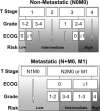Tumor biology and prognostic factors in renal cell carcinoma
- PMID: 21346035
- PMCID: PMC3868202
- DOI: 10.1634/theoncologist.2011-S2-04
Tumor biology and prognostic factors in renal cell carcinoma
Abstract
In the past 15 years, there has been an increased understanding of the tumor biology of renal cell carcinoma (RCC). The identification of vascular endothelial growth factor (VEGF), its related receptor (VEGFR), and the mammalian target of rapamycin as dysregulated signaling pathways in the development and progression of RCC has resulted in the rational development of pharmaceutical agents capable of specifically targeting key steps in these pathways. Clinical trials have demonstrated survival benefit with these agents, particularly in clear cell RCC patients. However, metastatic RCC will progress in all patients, resulting in a critical need to determine patient risk and optimize treatment. The goal of this article is to highlight the significant breakthroughs made in understanding the critical genetic alterations and signaling pathways underlying the pathogenesis of RCC. The discovery of prognostic factors and development of comprehensive nomograms to stratify patient risk and predictive biomarkers to facilitate individualized treatment selection and predict patient response to therapy also are reviewed.
Conflict of interest statement
The content of this article has been reviewed by independent peer reviewers to ensure that it is balanced, objective, and free from commercial bias. No financial relationships relevant to the content of this article have been disclosed by the authors or independent peer reviewers.
Figures



References
Publication types
MeSH terms
Substances
LinkOut - more resources
Full Text Sources
Medical
Miscellaneous

